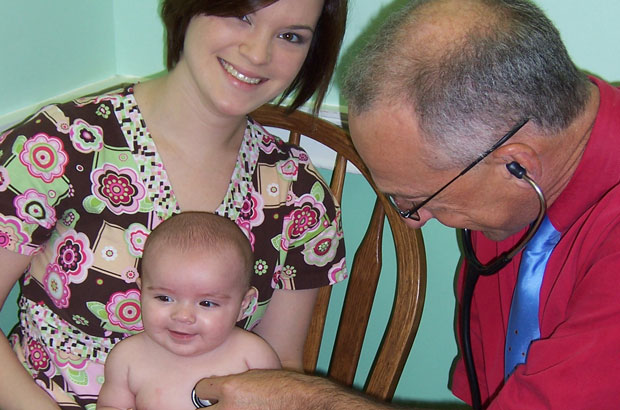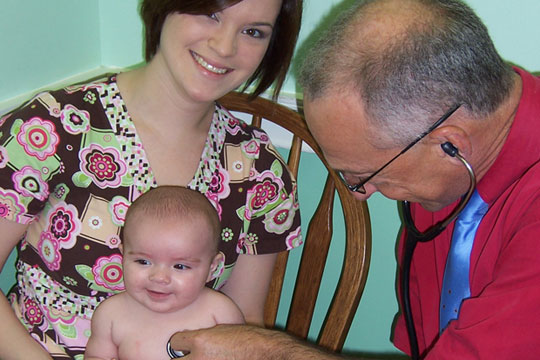
Johnny Peeples has practiced as a pediatrician in the central Georgia town of Eastman for 20 years. He’s there for the long haul. “I’m going to hang in there one way or another,’’ he says.
The economics of his practice, though, can appear daunting, especially with about two-thirds of his patients having government Medicaid or PeachCare insurance.
Those programs don’t pay enough to cover a physician’s costs now, say doctors organizations. So all the talk about the newly proposed rate cuts to physicians’ pay for Medicaid and PeachCare visits is ‘’a little scary,’’ Peeples says.
“It’s hard to keep a practice open when you see mostly Medicaid patients,’’ he adds.
The pay prospects for physicians took an ominous turn in September when the board of the Department of Community Health, which oversees Medicaid and PeachCare, approved major budget cuts in those programs as required by the governor’s office. State officials say the reductions could translate to decreases in medical providers’ pay of anywhere from 8.9 percent to 18.5 percent this fiscal year, and 7.1 percent to 10.8 percent for the 2012 fiscal year, which starts in July 2011.
Gov. Sonny Perdue’s office now says the first round of cuts may not occur because of an infusion of new federal dollars for Medicaid, which is jointly financed by the federal and state governments. Still, the budget for fiscal 2012 may contain substantial pain for physicians, nursing homes and other medical providers.
But while this year ‘s financial situation for Medicaid appears improved, fiscal 2012 looks like ‘’a whole different story,’’ says Bert Brantley, the governor’s spokesman.
Medicaid covers 1.4 million low-income or disabled Georgians, and PeachCare insures about 200,000 children of middle-income parents. Most Medicaid beneficiaries are children, so pay cuts would hit pediatricians particularly hard, says Rick Ward, executive director of the Georgia chapter of the American Academy of Pediatrics.
The Medicaid pay issue has surfaced before. Two years ago, it seemed to be good news for doctors – a scheduled pay increase of 2 percent for medical providers. That raise, however, never took effect because of budget constraints.
If their pay is cut, many doctors may stop seeing Medicaid patients, creating a flood of people seeking care in hospital emergency rooms, says Dalton pediatrician Martin Michaels. The ERs are the most expensive setting for delivering care, Michaels notes.
“The average provider can’t do it for less than what we’re getting [paid] now,’’ he says.
The Medical Association of Georgia, the largest doctors organization in the state, surveyed physicians in August about possible Medicaid pay cuts. Of the 500 physicians who responded, 44 percent said they would stop seeing Medicaid patients if the state reduced its reimbursement for services. Another 27 percent said they would no longer accept new Medicaid patients, said Donald Palmisano, MAG’s general counsel and director of government relations.
“The Medicaid program is clearly on an unsustainable track in Georgia,’’ he says.
Any Medicaid pay cuts would accelerate the trend of physicians seeking to be employed by hospitals, says Jimmy Lewis, CEO of HomeTown Health, an association of rural hospitals in Georgia.
Hospitals, rural health clinics, hospices and federally qualified health centers were exempted from the newly proposed cuts for Medicaid. Hospitals already pay a new ‘’tax’’ on net patient revenues to sustain the Medicaid program, and are receiving a reimbursement increase from the state.
Meanwhile, huge holes in the Medicaid and overall state budgets loom for legislators when the General Assembly convenes in January. In Medicaid alone, the state faces a $600 million to $700 million shortfall for next year, says Alan Essig, executive director of the Georgia Budget and Policy Institute, a nonprofit public policy organization. If the state implements major cuts in Medicaid payments to medical providers, Essig says, “it would devastate the health care infrastructure in the state – and local economies.’’
State Rep. Mickey Channell (R-Greensboro), chairman of a health subcommittee of the Appropriations Committee, says there aren’t many places to make cuts in Medicaid other than rates for medical providers. “We are already so low on provider reimbursement,’’ Channell says. “We need to avoid going there if there’s any way to do it.’’
Medicaid ‘’has been losing doctors for quite some time,’’ he says.
The nursing home industry says it’s on the bottom among Southeastern states on Medicaid reimbursements. Yet Jerry Dubberly, the state’s Medicaid director, says the pay rate for Georgia doctors and other medical providers ‘’is very competitive’’ with other Southern states.
Generally, any pay reduction to doctors would have to be passed along by the care management organizations (CMOs) that supervise care of most Medicaid and all PeachCare members. Ironically, the CMOs themselves are in line for a pay increase this fiscal year of 8 percent, reflecting inflation and an increase in hospital payment rates. But Medicaid officials say the CMOs could be candidates for a pay reduction the next fiscal year, based on cuts to doctors and other providers .
Physicians are the backbone of Medicaid, and that may be even more true in future years. Health care reform, if implemented, will expand the program’s enrollment, creating a bigger need for primary care doctors such as Peeples. “We have a big shortage of primary care docs already,’’ Channell says. A Medicaid expansion, he says, “will make that problem worse.’’
Two years ago, three pediatricians left Peeples’ medical practice, finding the financial outlook bleak. “It’s difficult to recruit physicians to this area,’’ he says. “I have a physician assistant and a nurse practitioner. They keep me in business. ‘’
Peeples’ medical practice already has some debt, and the office aims to install electronic medical record system in the next few months. If Medicaid payments are reduced, he says, he may have to reduce his office staff.
“I understand that across the board, it’s a challenging [financial] situation,’’ Peeples says. At the same time, he adds, “I love seeing Medicaid patients, but it’s a challenge to stay open.’’

